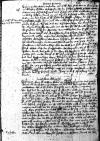Wir habenn vorstanden, / wie Ewer Herlichkeit kegen ⌊Pieterkow⌋ an koninglichen hof im kurtzenn zuzihenn bodocht sei. / Ehe den solchs geschiht, bittenn wir freuntlich / uns was zeitiger / vor Ewer Herlichkeit aufbrechenn / davon meldung zuthun, / damit, wo wir etzwas daselbst wurden auszurichten haben, / wie das durch Ewer Herlichkeit furderung schaffen mochten, / die sich auch darin, / wie wir nicht czweifeln, und Ewer Herlichkeit zu ⌊Vormdit⌋ kegen uns hat erboten, / gut willig wirdt finden lassenn. Ess hat uns vor etzlichenn tagen der grosmechtige her ⌊marienburgischer⌋ wojwode, / wie ehr von ⌊furstlicher durchlaucht⌋ zurucke gezogenn, durch sein schreiben vormeldet, / das im furstliche durchlaucht / vieler gutter lewte briefe aus ⌊Deutzschenlanden⌋ geczeget, / darin diesulbe vorwarnet wirdt / wegen des ⌊deutzschen meisters⌋ / vornomenen bey ⌊kaiserlicher majestet⌋, auch etzlicher deutzschenn / fursten, die ehr gerne widder dis landt erregen wolte. / Was hiraus werden wil, gibt die zeit zuerkennen. / Der almechtige Got verleihe uns fride zu unser tagen. Sunst bittet auch obgedochter her ⌊wojwode⌋ / bei Ewer Herlichkeit anzuhalten, / damit das gelt, / so den hern botschafternn czum zuge gefallen sol, / mochte durch Ewer Herlichkeit zusamen gebrocht , und dem hochwirdigen hernn , unserm freuntlichen, lieben brudern ⌊Tidemann⌋, bischofenn zu ⌊Culmenshe⌋, / und genantem hern wojwoden auf erste uberantwurt werden, / worin sich Ewer Herlichkeit, die wir gotlichenn genaden bovelen, / wol wirdt wissenn zu erzeigen, / auf das hiedurch die notige botschaft / nicht geseumet noch gehindert werde.
